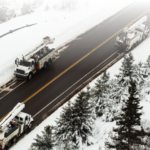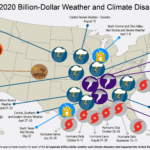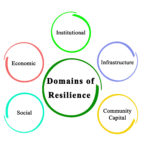NGA defines resilience as the ability to withstand disasters better, respond and recover more quickly, and excel under new conditions.
Governors increasingly face a host of human and natural disasters that threaten the viability of energy, water, transportation and other infrastructure assets that are critical to our way of life. Those disasters include severe storms, wildfires, droughts, inland flooding as well as diverse terrorism and cyber threats and chronic stressors such as poverty, disease, hunger, and violence. The impacts of these threats can be measured economically.
Incorporating resilience into emergency planning, infrastructure systems, and the built environment presents the opportunity to reduce vulnerabilities to future threats, mitigate the impacts of disasters, and lower the cost and effort needed to respond to and recover from disasters.
Resources

Our members recognize the substantial benefits provided to the nation by our water resources and hope to work together to ensure passage of a new bipartisan WRDA bill in 2022 ...

The White House is hosting a series of webinars for implementation stakeholders to provide an in-depth look into the programs contained within the chapters of "A Guidebook to the Bipartisan ...

The road map is a tool to help Governors prepare in advance of an energy emergency and inform their decision making in the event of an energy emergency. (Download) Executive ...

This guide provides examples of state-wide resilience considerations, important actions for states to enhance energy resilience planning, and potential funding and financing options to consider for energy resilience projects. (Download) ...

Governors are providing the bipartisan leadership needed to update and upgrade America's infrastructure. On November 30th thru December 2nd 2021, Governors and staff will join with federal agencies and private ...

Big Seven State and Local Organizations Urge House to Pass Senate Bill Today the leading organizations that represent state and local governments — The United States Conference of Mayors, National ...

State participants from Governors' offices and state energy offices convened to discuss energy resilience best practices related to planning and governance, cross-sector interdependencies, making energy systems resilient to severe hazards, ...

On this webinar, participants learned about GridEx VI - the biennial energy security exercise hosted by the North American Electric Reliability Corporation (NERC). Panelists discussed the focus of the exercise ...

NGA defines resilience as the ability to withstand disasters better, respond and recover more quickly, and excel under new conditions. Governors increasingly face a host of human and natural disasters ...

The SRAP tool is meant to help Governors and their staff assess state resilience, identify gaps, and plan for disasters. Nov 16, 2020 NGA hosted a webinar to provide an ...






















